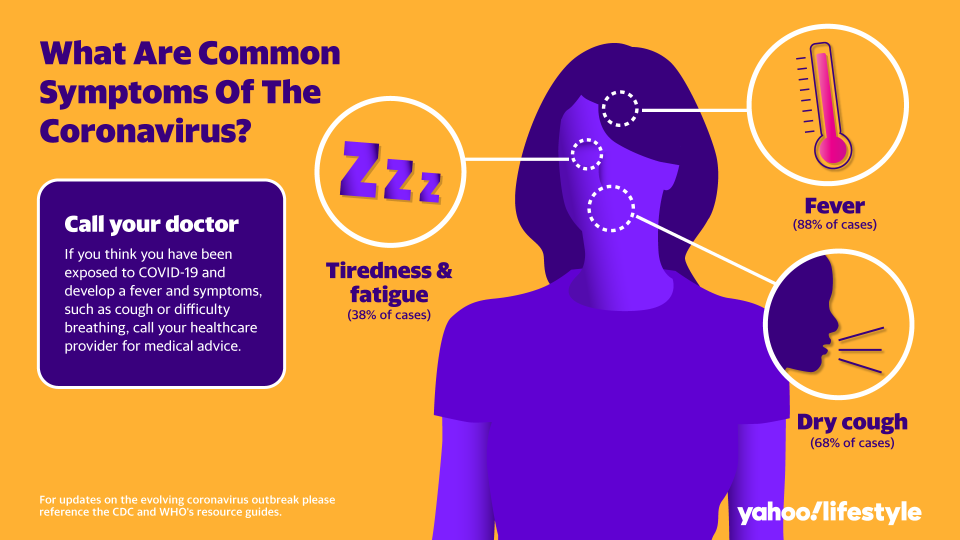Worried you're experiencing coronavirus symptoms? Here's what the CDC says to do

The coronavirus has done more than infect 7,300 in the United States and 214,000 worldwide — for the majority of people self-isolating to limit exposure (voluntarily or by executive order), and with flu season upon us, every sneeze or cough raises suspicion. It’s normal to worry, Do I have COVID-19?
Widespread coronavirus testing is not a reality, although states are introducing “drive-thru” stations to swab people in their cars. In the meantime, people who are feeling sick should listen to the Centers for Disease Control and Prevention (CDC), to protect themselves and others.
If you think you have coronavirus symptoms (fever, cough and shortness of breath) call your doctor for advice. People have reportedly flooded hospitals already at capacity — sometimes with mild or no symptoms — which puts a strain on medical resources, so that initial feedback can save you time and protect others from exposure (although, don’t hesitate to call 911 if you’re experiencing a medical emergency).
Related Video: Coronavirus Symptoms to Watch Out For
The CDC says that very mild cases of COVID-19 can be managed at home. There are currently no vaccines or drugs that cure the illness, although at least one clinical trial has begun and other countries are investigating potential treatments.
Everyone can help prevent the spread of #COVID19. Call your doctor if you develop symptoms, have been in close contact with a person known to have COVID-19, or have recently traveled from an area with widespread or ongoing community spread of COVID-19. https://t.co/ehL8kmRHaN pic.twitter.com/Hz49Y1CYg6
— CDC (@CDCgov) March 15, 2020
If you’re sick, there is a separate set of recommendations. Practice social distance (staying six-feet apart from others) and don’t venture outside or use public transportation (many states have stopped transit systems anyway). To avoid infecting family members or roommates, the CDC suggests designating oneself a “sick room” and using a separate set of dishes, cups, cutlery, bedding and towels, washing them after each use or regularly.
If you have tested positive for COVID-19 and have pets, avoid kissing or snuggling them, and if possible, have another family member care for them. If you live alone, make sure to wash your hands before and after coming into contact, says the CDC. The group states there is no evidence that household pets can be infected but “further studies are needed to understand if and how different animals could be affected by COVID-19.” If you do touch your pet, wash your hands immediately afterward.
When cleaning your home, the CDC suggests that someone who is not sick sanitize common areas and frequently-touched surfaces (the remote control, doorknobs, light fixtures) while you tend to your “sick room.” There’s lots of false advertising online for cleaning products that “kill the virus!” but the CDC suggests disinfectants registered with the Environmental Protection Agency (EPA) “based on data for harder to kill viruses.”
If your doctor wants to examine you, make sure the office knows about your symptoms, says the CDC, so staffers can ask questions and prep for your arrival. And now is the time to wear a face mask — there’s some confusion over who truly needs one, however, the CDC says as of now only sick people should wear masks to catch and contain respiratory droplets (how the disease is spread to others) from sneezing and coughing.

Of course, frequent hand washing is ideal (WHO published visual instructions for efficient scrubbing), using hand sanitizer with a minimum of 60% alcohol (if you can find it!) and not touching your eyes, nose and mouth can help stop the spread of infection.
With recovery, home isolation won’t always be necessary (although with counties ordering “shelter in place” and the closure of schools and major businesses), staying inside is our new norm. To determine whether or not you meet the conditions to discontinue home isolation, visit the CDC.
For the latest news on the evolving coronavirus outbreak, follow along here. According to experts, people over 60 and those who are immunocompromised continue to be the most at risk. If you have questions, please reference the CDC and WHO’s resource guides.

